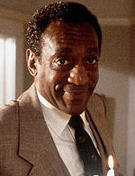Friday, June 29, 1990.
GHOST DAD. Written by Chris Reese, Brent Maddock and Steve Wilson. Music by Henry Mancini. Directed by Sidney Poitier. Running time: 83 minutes. Rated Mature with the B.C. Classifier’s warning: occasional coarse language and swearing.
AREN'T SURPRISES FUN?
Last year [1989], amid all the hype for Batman, Star Trek V and Ghostbusters 2, wasn't it nice that a "little" picture could come up through the pack and make it big at the box office?
Honey, I Shrunk the Kids, a Disney film in the tradition of The Absent Minded Professor, proved that there was still an audience for imaginative family fare.
This year, that audience pinned its hopes on Universal's Ghost Dad. Like Honey, it's a "family" comedy, opening with the promise of kid stars, fantasy adventure and lots of special effects.
Most of all, though, it promises us Bill Cosby, television's top pop. With his old buddy Sidney (Uptown Saturday Night) Poitier handling the directorial chores, how could they go wrong?
Surprise.
Ghost Dad is a dud, the sort of awkward misfire that fuels the fear that Cosby's disastrous Leonard Part 6 was no aberration.
Fun, it's not. Credit the filmmakers with courage for embracing the potentially off-putting subject of parental death. As Elliot Hopper, Cosby is a single parent separated from his children by an untimely accident.
Due to an "intercorporeal maltransference," Hopper finds himself suspended between here and the hereafter, an entity with a sense of mission towards his newly orphaned offspring.
To govern his interactions with the living, screenwriters Chris Reese, Brent Maddock and Steve Wilson provide the following ground rules:
1. Hopper is visible in the dark, but not in the light.
2. His "normal" state is non-physical, giving him the ability to float or walk through walls.
3. If he really concentrates, he can become physically present, grasp things and be heard.
Set in no known reality, Ghost Dad opens with widower Hopper neglecting his children Diane (Kimberly Russell), Danny (Salim Grant) and Amanda (Brooke Fontaine) while in pursuit of a corporate promotion that will guarantee him a much-needed benefits plan.
Because his demise comes just days short of this breakthrough, he returns to enlist the kids in a ruse to conceal the truth.
Risky material for comedy in the best of hands, Ghost Dad suffers from the same emotional callousness that afflicted Leonard. "Daddy's home and he's dead" is less a sitcom premise than a horror film plotline.
Here, the tastelessness is heightened by the kids' blithe acceptance of their father's "condition." The fact that their own self-centred concerns don't change, the fact that they experience no feelings of grief or loss, is neither believable nor in keeping with real human characters.
"Dead people can be such jerks," complains 17-year-old Diane, when Hopper objects to her seeing a thoroughly moronic boy named Tony (Dana Ashbrook).
A film made by people apparently dead from the neck up, Ghost Dad qualifies as the most bizarre major studio film of the summer.
The above is a restored version of a Province review by Michael Walsh originally published in 1990. For additional information on this archived material, please visit my FAQ.
Afterword: Ghost Dad was the ninth and last feature film directed by Sidney Poitier. During the 1990s, he also wound down his acting career, appearing in just two more features and eight television productions. In 1997, he was seen as political revolutionary Nelson Mandela, in the TV movie Mandela and de Klerk. That same year, he was appointed the Bahamian ambassador to Japan, becoming a diplomat and public servant in real life.
Some background is probably necessary here. Born in Miami, Florida, in 1927, Sidney Poitier is an American citizen. Because his parents were Bahamians visiting the U.S., he was also a British subject. (When the Bahamas gained its independence in 1973, he automatically became a citizen of the new nation.) He returned with them to the Bahamas, where he grew up on the family farm on Cat Island. Poitier moved to New York at the age of 15, where he eventually found his calling as an actor and joined Harlem’s American Negro Theatre.
“Discovered” in 1949 by producer Darryl F. Zanuck, he made his movie debut in the 1959 social drama No Way Out. And there his half-century Hollywood biography begins. Not one to forget his origins, Poitier maintained his British connections. In 1974, he was knighted by Her Majesty Queen Elizabeth II. In 1976, Sir Sidney took as his bride Canadian actress Joanna Shimkus, his co-star in the 1969 drama The Lost Man. Earlier this year, they celebrated their 46th wedding anniversary, and his 92nd birthday.
Poitier performances: Already included in the Reeling Back archive are director Roger Spottiswoode’s 1988 made-in-Vancouver thriller Shoot to Kill, and Phil Alden Robinson’s computer-crime drama Sneakers (1992).
The Before Picture: The five Bill Cosby features posted to the Reeling Back archive today include director Sidney Poitier’s 1974 comedy Uptown Saturday Night and his 1990 family fantasy Ghost Dad; Peter Yates’s action comedy Mother, Jugs & Speed (1976), Steven Hilliard Stern’s afterlife fantasy The Devil and Max Devlin (1981) and Paul Weiland’s spy farce Leonard Part 6 (1987).
